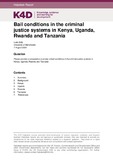| dc.contributor.author | Kelly, Luke | |
| dc.coverage.spatial | Kenya | en |
| dc.coverage.spatial | Uganda | en |
| dc.coverage.spatial | Rwanda | en |
| dc.coverage.spatial | Tanzania | en |
| dc.date.accessioned | 2020-10-05T15:19:31Z | |
| dc.date.available | 2020-10-05T15:19:31Z | |
| dc.date.issued | 2020-08-07 | |
| dc.identifier.citation | Kelly, L. (2020). Bail conditions in the criminal justice systems in Kenya, Uganda, Rwanda and Tanzania. K4D Helpdesk Report 863. Brighton, UK: Institute of Development Studies. | en |
| dc.identifier.uri | https://opendocs.ids.ac.uk/opendocs/handle/20.500.12413/15680 | |
| dc.description.abstract | This rapid literature review finds evidence of varied bail conditions in Kenya, Uganda, Rwanda and Tanzania. The African Charter, which all the states have ratified, supports the right to bail, as do other international instruments. Most of the countries surveyed allow bail, but conditions vary as do practical applications. This review surveys the law on bail, as well as evidence on how the laws are enacted in practice. Legal documents, as well as academic and policy analysis have been used. This includes some analysis of "wider structural socio-political contexts, existing institutions/rules of the game (both formal and informal), associated incentive and interest structures and the particular features of the balance of power between relevant actors and stakeholders. This review highlights some key findings, including in Kenya, there is a right to bail for all offences (serious offences by a court only), but much discretion is granted to the authorities, and research has found that the rules are applied inconsistently and there is a high rate of pre-trial detention. Meanwhile, bail is a right for most in Uganda, but bail for some serious crimes can only be granted by the High Court; however, in practice, it is hard to get bail and there is a high rate of pre-trial detention. In Rwanda, bail may be given for all offences provided conditions are met and the rate of pre-trial detention is relatively low, although there is evidence that some are detained outside of the judicial system and without a trial or the option of bail. Finally, in Tanzania, bail can be granted with certain mandatory restrictions and there is an on-going legal dispute about whether the right to bail extends to those accused of certain serious crimes. Research shows refusal of bail is being used against critics of the Tanzanian government and there is a high rate of pre-trial detention. | en |
| dc.description.sponsorship | FCDO (Foreign, Commonwealth and Development Office) | en |
| dc.language.iso | en | en |
| dc.publisher | Institute of Development Studies | en |
| dc.relation.ispartofseries | K4D Helpdesk Report;863 | |
| dc.rights.uri | https://www.nationalarchives.gov.uk/doc/open-government-licence/version/3/ | en |
| dc.subject | Governance | en |
| dc.subject | Rights | en |
| dc.subject | Security and Conflict | en |
| dc.title | Bail Conditions in the Criminal Justice Systems in Kenya, Uganda, Rwanda and Tanzania | en |
| dc.type | Helpdesk | en |
| dc.rights.holder | © Crown copyright 2020 | en |
| dcterms.dateAccepted | 2020-08-07 | |
| rioxxterms.funder | Default funder | en |
| rioxxterms.funder | Department for International Development, UK Government | en |
| rioxxterms.identifier.project | Default project | en |
| rioxxterms.identifier.project | K4D | en |
| rioxxterms.version | VoR | en |
| rioxxterms.funder.project | 9ce4e4dc-26e9-4d78-96e9-15e4dcac0642 | en |
| rioxxterms.funder.project | 238a9fa4-fe4a-4380-996b-995f33607ba0 | en |

